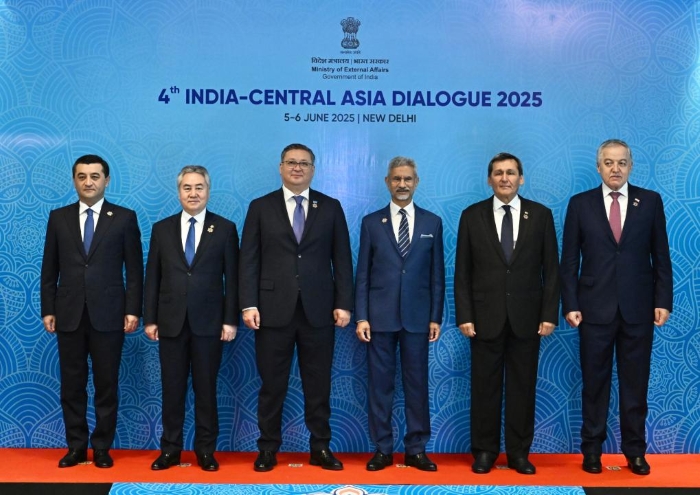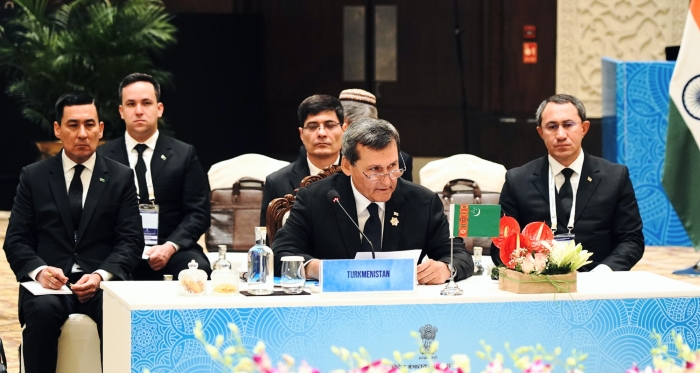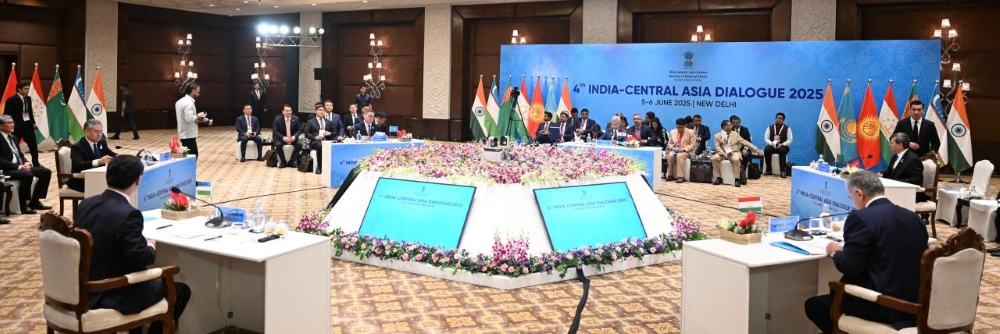On 6 June 2025, the 4th meeting of the “Central Asia – India” Dialogue was held in New Delhi, with the participation of the foreign ministers of India, Kazakhstan, Kyrgyzstan, Turkmenistan, Tajikistan, and Uzbekistan.
During the meeting, the foreign ministers discussed promising areas of multilateral cooperation and issues aimed at enhancing the effectiveness of economic interaction, including mutual trade, investment activities, industry, and strengthening transport connectivity with India.
It was noted that diplomatic engagement within this multilateral cooperation mechanism is aimed at promoting a culture of interstate dialogue and strengthening mutually beneficial partnerships on global and regional agenda issues.
Turkmenistan’s Foreign Minister Rashid Meredov emphasized that Turkmenistan actively promotes trade, economic, and investment integration and initiates large-scale infrastructure and logistics projects. In this context, special attention was given to the relevance of ongoing economic projects designed to enhance connectivity between the Central Asian region and India, with the Turkmenistan–Afghanistan–Pakistan–India (TAPI) gas pipeline project holding a prominent place.
Additionally, the development of the transport and transit potential of Central Asian countries and India was discussed, including the promotion of joint initiatives to create regional and international transport corridors.
Touching on the topic of regional security, it was noted that Turkmenistan’s neutral status serves as an effective tool for peacekeeping, strengthening security, and ensuring stability at both regional and global levels.
In the context of expanding cooperation in the fields of innovative technologies, digitalization, biotechnology, and nanotechnology, a proposal was made to explore the possibility of creating a Joint Program for Technological and Scientific Cooperation between Central Asia and India, with a focus on educational exchanges, joint research, startup support, and the integration of innovations into production.
Special emphasis was placed on the importance of cooperation in healthcare, pharmaceuticals, and scientific research.
In conclusion, it was noted that in the current global context, the combined political and diplomatic potential of Central Asian countries and India, along with their joint capabilities, contributes to addressing global and regional challenges and can serve as a positive factor in ensuring long-term political stability, economic resilience, and a balanced approach to common interests.
Following the fourth meeting of the Central Asia–India Dialogue, a Joint Statement was adopted.
The statement highlights a strong commitment from both India and the Central Asian countries (Kazakhstan, Kyrgyz Republic, Tajikistan, Turkmenistan, and Uzbekistan) to build a forward-looking, comprehensive, and enduring partnership. The dialogue serves as a crucial platform for multifaceted cooperation.
Key areas of cooperation and discussion include:
- Economic Ties: Emphasizing increasing trade and investment, particularly in sectors like pharmaceuticals, IT, agriculture, energy, textiles, gems, and jewelry. There’s a focus on enhancing financial connectivity, including digital payment systems and trade in national currencies, and a proposal to establish a Joint Working Group for deeper banking and financial linkages.
- Connectivity: Stressing the importance of the International North-South Transport Corridor (INSTC) and India’s support for Turkmenistan and Uzbekistan’s membership. The statement also notes the successful meeting of the India-Central Asia Joint Working Group on Chabahar Port and the interest of Central Asian countries in utilizing it.
- Capacity Building and Development: Appreciation for India’s ITEC Programme in human resource development and agreement to expand its scope. Interest in strengthening cooperation in Science & Technology, Space, and Innovation, and India’s offer to assist in developing Digital Public Infrastructure (DPI) in Central Asian countries, with the establishment of an India-Central Asia Digital Partnership Forum.
- Resources: Interest in joint exploration of rare earth and critical minerals, and a call for a second India-Central Asia Rare Earth Forum.
- Security and Counter-Terrorism: Reaffirming commitment to fight terrorism in all its forms and manifestations, condemning terrorist attacks, and stressing the need to hold perpetrators accountable. Importance of regular consultations among National Security Councils.
- Regional and Global Issues: Support for a peaceful and stable Afghanistan, free from terrorism and drugs. Discussions on UN initiatives like the “International Year of Peace and Trust” (2025) initiated by Turkmenistan, and the “International Year of Glaciers’ Preservation – 2025” initiated by Tajikistan.
- International Organizations: Recognition of the SCO’s role in regional peace and development, and India’s active engagement. Central Asian countries reiterated support for India’s permanent membership in a reformed UN Security Council.
The sides agreed to hold the next meeting of the India-Central Asia Dialogue in 2026 and to prepare for the second India-Central Asia Summit in 2025. ///nCa, 7 June 2025
Joint Statement of 4th India-Central Asia Dialogue (June 06, 2025)
June 06, 2025
The 4th meeting of the India-Central Asia Dialogue was held in New Delhi on 6 June 2025 under the chairship of the External Affairs Minister of India. Ministers of Foreign Affairs of the Republic of Kazakhstan, the Kyrgyz Republic, the Republic of Tajikistan, Turkmenistan and the Republic of Uzbekistan took part in the meeting.
2. The Ministers underlined the civilizational, cultural, and people-to-people linkages between India and Central Asian countries and reaffirmed their commitment to building a forward-looking, comprehensive and enduring India-Central Asia partnership.
3. The Ministers appreciated the role of the India-Central Asia Dialogue, as a valuable platform for strengthening the multifaceted cooperation, addressing common challenges and tapping unrealised potential. They emphasized that cooperation between India and Central Asia seeks to enhance regional peace, security, stability, sustainable economic growth and continued prosperity in the region.
4. The Ministers expressed satisfaction at the progress in implementation of the decisions taken by the Leaders at the 1st India-Central Asia Summit in January 2022.
5. The Ministers noted the current level of trade and investment between India and Central Asian countries and stressed the importance of making concerted efforts to realise the full potential of mutual trade, especially in sectors like pharmaceuticals, information technology, agriculture, energy, textiles, gems and jewellery etc.
6. The Ministers underlined the importance of greater financial connectivity between India and Central Asian countries, including through digital payment systems, enhanced interbank relations, and trade in national currencies to encourage greater trade, investment, tourism and people-to-people exchanges. Recognising the important role of financial and banking linkages, the Sides also expressed interest to establish a Joint Working Group to explore ways to further deepen banking and financial connectivity between India and Central Asian partners.
7. The Ministers emphasized optimum usage of the International North-South Transport Corridor (INSTC) to enhance connectivity between India and the Central Asian countries. They stressed that connectivity initiatives should be based on the principles of transparency, broad participation, local priorities, financial sustainability, respect for sovereignty and territorial integrity of all countries. India reiterated its support for the membership of Turkmenistan and Uzbekistan in INSTC. In this context, Ministers appreciated the initiative taken by Kazakhstan to develop the eastern branch of INSTC.
8. The Ministers appreciated the First meeting of the India-Central Asia Joint Working Group on Chabahar Port held in Mumbai in April 2023. India welcomed the interest of Central Asian countries to utilize the services of Shahid Beheshti Terminal at the Chabahar Port for facilitating their trade with India and beyond. The Sides agreed to continue engagement for further developing the transit and transport potential of their countries, through simplification and streamlining of goods transit procedures, including greater use of TIR Carnet between India and Central Asia.
9. The Ministers welcomed the efforts of the India-Central Asia Business Council (ICABC), as a B-2-B body under the India-Central Asia Dialogue, to promote business linkages, identify potential areas for investments, and facilitate greater understanding of business regulations.
10. The Ministers of Foreign Affairs of Central Asia appreciated the important role of the Indian Technical and Economic Cooperation (ITEC) Programme in capacity building and human resource development of their countries, especially in Information Technology and communication skills in the English language. India agreed to expand the scope of ITEC programmes to cover more areas of interest to Central Asian countries.
11. The Ministers also expressed interest in strengthening mutual cooperation in the field of Science and Technology, Space, and Innovation by enhancing direct cooperation between government organizations, research institutes, innovation centres and technological enterprises of India and the Central Asian countries.
12. The Central Asian countries noted the importance of India Stack in accelerating digital transformation and providing public service delivery at scale. India agreed to provide assistance in developing Digital Public Infrastructure (DPI) in Central Asian countries. The Ministers agreed to establish India-Central Asia Digital Partnership Forum and welcomed Uzbekistan’s offer to host the inaugural meeting.
13. Underscoring the importance of technology cooperation as a vital pillar of development partnership between India and Central Asian countries, the Ministers agreed to work together to harness innovative solutions in areas such as public health, strengthening food security and energy security. The sides acknowledged the potential of leveraging digital tools and capacity-building initiatives to address common challenges and promote inclusive and sustainable growth.
14. The Ministers expressed their desire to deepen cooperation in the health-care sector, including medical tourism. Following India’s “One Earth, One Health” vision, the sides agreed to work together to enhance healthcare infrastructure and medical service delivery, and promote traditional medicine in Central Asian countries. India also offered technical support for designing Universal Health Coverage (UHC) models in Central Asia. They also agreed to explore possibility of establishing Joint Working Group on Cooperation in Healthcare.
15. The Sides expressed interest in joint exploration of rare earth and critical minerals. Appreciating the outcomes of the first India-Central Asia Rare Earth Forum held in September 2024 in New Delhi, they called upon the relevant authorities to hold the second India-Central Asia Rare Earth Forum meeting at the earliest convenience. The Ministers also encouraged exchange of delegations to explore new areas of cooperation in critical minerals.
16. The Ministers reaffirmed their commitment to deepening and expanding collaboration in capacity building. In this regard, the Ministers of Foreign Affairs of Central Asian countries appreciated the successful organisation of capacity building programmes by India for Drug Law Enforcement Officers from Central Asian countries in December 2024 and on Countering Financing of Terrorism in New Delhi in April 2025.
17. Taking forward the South-South cooperation, the Ministers agreed to work closely with India’s Global South Centre of Excellence “DAKSHIN” (Development and Knowledge Sharing Initiative) to learn from each other’s development experiences.
18. Recalling the age-old cultural and civilizational links between India and the Central Asian countries, the Sides stressed on the importance of promoting bilateral cooperation in cultural, educational and humanitarian spheres to further invigorate people-to-people contacts. Foreign Ministers of the Central Asian countries appreciated the role played by the Indian Cultural Centres in strengthening India-Central Asia cultural relations. The Ministers welcomed Tajikistan’s offer to host the second meeting of India-Central Asia Culture Ministers.
19. The Ministers noted the importance of holding regular consultations among the National Security Councils of India and the Central Asian countries to strengthen efforts to counter terrorism and other emerging challenges in the region. They looked forward to the third edition of the Consultations to be held in the Kyrgyz Republic.
20. The Ministers unequivocally condemned the terrorist attack in Pahalgham. They reaffirmed their firm commitment to fight against terrorism in all its forms and manifestations and reiterated that providing safe haven, using terrorist proxies for cross-border terrorism, terror financing, arms and drugs trafficking, dissemination of a radical ideology and abuse of cyber space to spread disinformation and incite violence, goes against the basic principles of humanity and international relations. They stressed that perpetrators, organizers, financiers and sponsors of terrorist acts must be held accountable and brought to justice. In this context, they called for early adoption of the UN Comprehensive Convention on International Terrorism. They stressed the need to strengthen UN-led global counter-terrorism cooperation and fully implement the relevant UNSC resolutions, Global Counter-Terrorism Strategy and FATF standards.
21. The Ministers welcomed the designation of 2025 as the “International Year of Peace and Trust” in accordance with UN General Assembly Resolution Number 78/266 of 21 March 2024, initiated by Turkmenistan, and the holding of the “International Forum of Peace and Trust” in 2025 in Ashgabat.
22. Ministers commended the First High-Level International Conference on Glaciers’ Preservation, held on 29 – 31 May 2025 in Dushanbe, Tajikistan as part of observing the International year of Glaciers’ Preservation – 2025 and World Glaciers’ Day – 21 March, which emphasized the crucial connection between glaciers and sustainable socio-economic development.
23. Ministers noted the importance of implementing the resolution of the 77th session of the UN General Assembly “Sustainable Mountain Development”, which declared 2023-2027 as the “Five-Year Action Plan for the Development of Mountain Regions”, in order to strengthen international cooperation on the mountain agenda and its further effective implementation and expressed their readiness to actively participate in the Second Global Mountain Summit “Bishkek+25″ in 2027 at a high level.”
24. The Ministers noted the important role played by the SCO in creating conditions for strengthening peace, security, stability, economic development and people-to-people exchanges in the region. They highly appreciated the results of the meeting of the Council of SCO Heads of State held in Astana on 04 July 2024. They noted that Central Asia will always remain at the core of the SCO, and it is important to prioritize the interests and aspirations of the Central Asian countries. The Ministers of Foreign Affairs of Central Asia appreciated the proactive engagement of India in SCO and commended the outcomes of the Council of SCO Heads of State hosted by India on 04 July 2023.
25. India highlighted the role of “International Solar Alliance (ISA)” and “Global Biofuels Alliance (GBA)” as effective mechanisms for the effective implementation of the Paris Agreement. The important role of “Coalition for Disaster Resilient Infrastructure (CDRI)” in promoting disaster resilient infrastructure for reducing economic losses and improving the well-being of communities in the face of calamities and the role of “International Big Cat Alliance (IBCA)” in conservation of big cats was noted by the Central Asian ministers. India invited Central Asian countries to join the ISA, GBA, IBCA and CDRI.
26. The Ministers of Foreign Affairs of Central Asian countries reiterated support of their countries for permanent membership of India in an expanded and reformed UN Security Council.
27. The Ministers reiterated their strong support for a peaceful and stable Afghanistan which is free from terrorism, war and drugs. They stressed the need to stand by the people of Afghanistan. The Ministers agreed to continue close coordination and consultations on matters related to Afghanistan.
28. The Ministers commended the integration of the regional logistics hub in Termez, Uzbekistan into the global stockpile network to enhance UNHCR’s capacity for the rapid delivery of core relief items to forcibly displaced people worldwide.
29. The Ministers welcomed the initiative of Kazakhstan to establish the UN Hub on the Sustainable Development Goals (SDGs) for Central Asia and Afghanistan in Almaty. They reaffirmed their commitment to continued collaboration in advancing the SDG agenda throughout the region.
30. The Ministers appreciated the successful annual visits of youth delegations from Central Asian countries to India and emphasised the role of such visits in building strong people-to-people ties. Taking note of the large number of students from India and the Central Asian countries studying in each other’s higher educational institutions, the Ministers stressed the importance of ensuring their welfare.
31. The Ministers also reaffirmed their commitment to work towards advancing mutual objectives and deepening collaboration across shared priorities to prepare ground for holding the second India-Central Asia Summit at a mutually convenient date in 2025.
32. The Ministers of Central Asian countries thanked the External Affairs Minister of India for the warm hospitality accorded to their delegations for the 4th meeting of the India-Central Asia Dialogue in New Delhi. The Ministers agreed to hold the next meeting of the India-Central Asia Dialogue in 2026. ///MEA India


